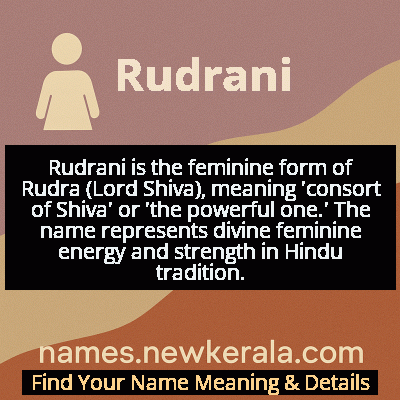Rudrani Name Meaning & Details
Origin, Popularity, Numerology Analysis & Name Meaning of Rudrani
Discover the origin, meaning, and cultural significance of the name RUDRANI. Delve into its historical roots and explore the lasting impact it has had on communities and traditions.
Name
Rudrani
Gender
Female
Origin
Hindu
Lucky Number
4
Meaning of the Name - Rudrani
Rudrani is the feminine form of Rudra (Lord Shiva), meaning 'consort of Shiva' or 'the powerful one.' The name represents divine feminine energy and strength in Hindu tradition.
Rudrani - Complete Numerology Analysis
Your Numerology Number
Based on Pythagorean Numerology System
Ruling Planet
Uranus (Rahu)
Positive Nature
Strong sense of order, loyal, practical, and disciplined.
Negative Traits
Stubborn, overly serious, rigid, and prone to feeling restricted.
Lucky Colours
Blue, gray.
Lucky Days
Saturday.
Lucky Stones
Blue sapphire.
Harmony Numbers
1, 7, 8.
Best Suited Professions
Managers, engineers, accountants, organizers.
What People Like About You
Dependability, discipline, practicality.
Famous People Named Rudrani
Rudrani Chettri
LGBTQ+ Activist
Founder of 'The Devi Project' and prominent transgender rights activist
Rudrani Devi
Classical Dancer
Renowned Odissi dancer who helped revive the classical dance form
Rudrani Ghosh
Actress
Indian television and film actress known for Bengali cinema roles
Name Variations & International Equivalents
Click on blue names to explore their detailed meanings. Gray names with will be available soon.
Cultural & Historical Significance
The concept of Rudrani embodies the balance between creation and destruction, representing the cyclical nature of existence that is central to Hindu philosophy. In temple traditions and religious practices, Rudrani is worshipped as a protective deity, particularly in Shakta traditions where the feminine divine is paramount. The name's cultural resonance extends beyond religious contexts into artistic and literary realms, where it symbolizes empowered femininity and spiritual depth. Throughout Indian history, the name has maintained its sacred character while adapting to contemporary understandings of feminine strength and independence.
Extended Personality Analysis
Women named Rudrani are often perceived as strong-willed, independent, and spiritually inclined individuals. They typically exhibit natural leadership qualities combined with deep emotional intelligence, making them both formidable and compassionate. Their personality often reflects a balance between strength and sensitivity, much like the divine feminine energy their name represents. Rudranis are known for their determination and resilience in facing challenges, yet they maintain a nurturing aspect that draws people toward them.
These individuals tend to be introspective and philosophical, with a natural curiosity about spiritual matters and life's deeper meanings. They often possess a quiet confidence that doesn't need external validation, and their decision-making is typically guided by both intuition and rational thought. In relationships, Rudranis are loyal and protective, often taking on the role of the pillar of strength for their loved ones. Their combination of inner fortitude and emotional awareness makes them effective in leadership positions while maintaining genuine connections with others. The name seems to attract or cultivate women who embody the ancient wisdom and modern strength that the name symbolizes.
Modern Usage & Popularity
In contemporary times, Rudrani remains a relatively uncommon but deeply meaningful choice for baby girls, particularly among families with strong Hindu cultural roots. The name has seen a modest resurgence in recent years as parents seek traditional names with spiritual significance that also convey strength and independence. While not among the most popular names in India, it maintains a steady presence in regions with strong Shiva worship traditions, especially in North India, Maharashtra, and among diaspora communities worldwide. Modern Rudranis often appreciate their name's unique quality and cultural depth, though some may choose shortened forms like 'Rudi' for casual use. The name continues to be favored by educated, urban parents who value both cultural heritage and progressive values, seeing in the name a celebration of feminine power that transcends traditional gender roles.
Symbolic & Spiritual Meanings
Symbolically, Rudrani represents the transformative power of the divine feminine, embodying both creative and destructive energies necessary for cosmic balance. The name carries connotations of strength, protection, and spiritual evolution, symbolizing the journey from darkness to enlightenment that is central to Hindu tantric traditions. Like the goddess she represents, a Rudrani is seen as a force of nature - capable of fierce protection and gentle nurturing in equal measure, reflecting the dual aspects of the feminine principle. The name also symbolizes the sacred union of masculine and feminine principles (Shiva-Shakti), representing completeness and the harmonious balance of opposing forces that creates and sustains the universe. In a broader philosophical sense, Rudrani signifies the eternal cycle of creation, preservation, and transformation that governs existence according to Hindu cosmology, making her a symbol of both temporal power and eternal truth.

